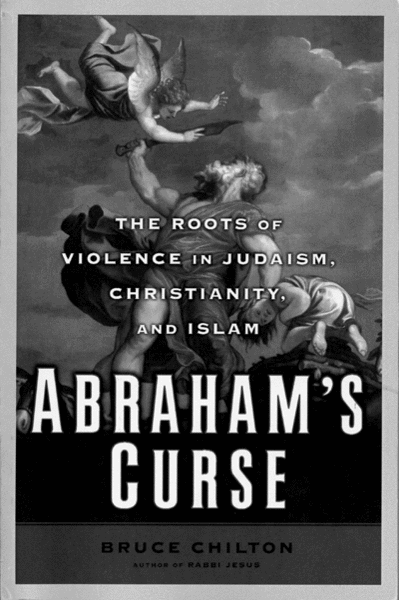Abraham’s Curse: The Roots of Violence in Judaism, Christianity, and Islam
Bruce Chilton
Doubleday, February 2008, $24.95
Bruce Chilton, rector at the Church of St. John in Barrytown, New York, and professor of religion at Bard College, brings his formidable religious scholarship to bear on one of the most familiar stories of the Old Testament, that of Abraham and Isaac: the Aqedah.
In a vision, God commands Abraham to sacrifice his son, Isaac. Abraham binds Isaac and takes up his knife to kill him. The founding patriarch of Judaism, Christianity, and Islam sees in his son’s eyes the reflection of an angel who has appeared to instruct him to spare the child. Isaac, a willing martyr, is allowed to live. In his stead, Abraham sacrifices a ram.
The Aqedah, the author tells us, is at the root of a culture of martyrdom that exists to this day each of the three religions, though modern-day adherents are often reluctant to acknowledge it. It is a culture based on a misinterpretation of the Aqedah, which he sees as an instruction against the sacrifice of human life, rather than a call to martyrdom for the faithful.
Chilton traces interpretations of the Aqedah through the history of each religion, histories that often interweave and clash violently. “Abraham’s curse insinuated itself through the development of Judaism and Christianity, linking them in a common devotion to the ideal of giving one’s own life in order to preserve faith.”
Christianity put forth Christ’s supreme sacrifice (human life) as evidence that “martyrdom was necessary to bring Jesus’s crucifixion alive to new generations of believers.” In the face of Roman persecution and continuing long after persecution had ceased and Rome had become Christian, martyrs “helped turn what had been a marginal sect into a world religion whose power and influence became incalculable.” The arrival of the Middle Ages saw the advent of the Christian Soldier, wherein “the benefit of martyrdom could accrue even to those who risked their lives by engaging in violence. on behalf of faith in Christ.” Judaism and Jews were often the targets of these warriors, and the medieval Crusades saw the violence taken to Islamic territories.
The Islamic Aqedah, says Chilton, “like the interpretations of Genesis 22 in Judaism and Christianity, is a living tradition that pushes past the limitations of any single text to convey a burning vision that glorifies the martyr’s sacrifice.”
But in his deft analysis of Muslim militancy, Christian Fundamentalism, and Israeli extremism, the author posits “the caricature of Islam in popular culture in the United States greatly diminishes the probability of genuine insight into what Muslims think, believe, and feel.” In a time when many millions of Christians in the Unites States have embraced Christian Fundamentalism, “confusing Fundamentalist dogma with what the Bible and Christian tradition actually say,” the tendency since the War on Terror has been to evaluate Islam according to the actions of Muslim militants who “account for only 10 to 15 percent of the faithful.”
Abraham’s Curse, very well written and scrupulously researched, is thought-provoking—at times chilling—but rendered in a compassionate tone that enables the reader to journey through blood-soaked religious history and emerge with a heightened comprehension of the misguided religious motivations that drive events in today’s headlines. Whether believers or not, Chilton says, we would do well to try to understand, for “any voice that calls us back to human sacrifice, in whatever form, is not God’s.”
Bruce Chilton will read from Abraham’s Curse at Merritt Books in Red Hook on March 8 at 11am and on March 9 at noon in Millbrook.
















